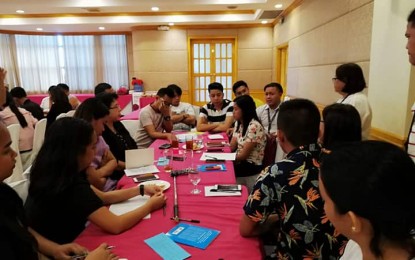
PUSHING FOR LGBTQI RIGHTS. Representatives from the Commission on Human Rights, inter-faith groups, academe, non-government organizations, among others, discuss on Thursday (July 11, 2019) the challenges and ways to address issues confronting the LGBTQI community. The CHR in Western Visayas said the commission will protect the rights of the children with diverse sexual orientation, gender identity, and gender expression, and will push to give them equal treatment and opportunities. (PNA Photo by Gail Momblan)
ILOILO CITY -- The Commission on Human Rights (CHR) in Western Visayas said parents should be the first to respect the rights of their children, especially kids with diverse sexual orientation, gender identity, and gender expression (SOGIE).
The CHR, together with the members of the LGBTQI (lesbian, gay, bisexual, transgender, queer or questioning, and intersex), local government units, inter-faith organizations, non-government organizations, among others, on Thursday, has put into discussion the sexual orientation, gender identity, and gender expression of children.
Christopher Montaño, information officer of CHR 6, said the commission came in to protect the rights of the children.
He said discussions in sexuality are considered taboo in some families. “The children have the freedom to actualize their feelings and it is wrong to hold them back because of the wrong perception of the community,” he said.
Montaño said the universal declaration of human rights states that “men and women are born free and equal.”
He said the society has been living in binary or recognizing only males and females, and therefore parents impose upon their children to identify themselves only as male or female.
“The binary perception of the society has caused discrimination and bullying to members of the LGBTQI,” he explained.
Harsh manners towards the members of the LGBTQI like discrimination and bullying “are recognized as punishable acts and offenses by different laws of the land”, Montaño said.
Jude Osanos, a member of the LGBTQI, shared to the gathering his experiences as a child with diverse SOGIE. He said the major challenge of a child with diverse SOGIE is the difficulty in understanding his or her own self.
“Machismo”, or aggressive masculine conceit, also prevails in some families which add to the child’s confusion and struggle to come out.
“The parents should realize that it is not their children’s fault to have a different sexual orientation or sexual identity. The parents should not add to the wrong perception imposed by the society,” Montaño said.
“The children are exposed to different appreciations of their personalities. They are confused and if you are confused, how can you understand the other people around you?” he added.
Instead, parents should realize that it is not their children’s fault to have different sexual orientations.
“One of the major battles fought every day is at home. Unknown to both parents and children, some home creates an atmosphere where children are at risk and when a child is at risk, sooner or later, the child will become a child in conflict with the law,” he said.
Montaño said all participants in the discussion have agreed that society is not yet ready to fully embrace the people from the LGBTQI sector.
Structures and legislation that supports the LGBTQI sector are also not yet put in place, he said.
The result of the discussion will be consolidated on the national level for a publication intended for the Children’s Month in November.
It will also be a guide for the CHR to help craft laws that address the issues confronting the LGBTQI sector, he added. (PNA)
